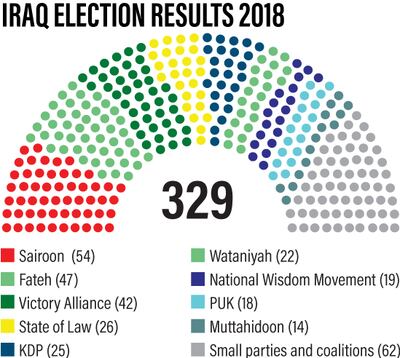Iraq elections have come and gone, leaving in their wake a historically low turnout and a surprising victory by populist cleric Moqtada Al Sadr, whose Sairoon (Marching Towards Reform) bloc won 54 seats in parliament.
"Your vote is an honour for us," Mr Al Sadr said in a Twitter just moments after the official announcement on Friday night. "We will not disappoint you," he wrote.
The election win marks the most significant victory of Mr Al Sadr's political career, but it does not automatically guarantee that he will be able to hand-pick a prime minister or determine the future of Iraqi politics.
As Baghdad embarks on discussions for a new government expected to last for months, there is no telling what scenarios might ensue.
______________
Read more:
Iraq's Abadi congratulates Sadr on election performance
Rise of Moqtada Al Sadr upsets US calculations in Iraq
______________
Experts and analysts stressed that it is still too early to determine what the next government will look like, but Mr Al Sadr has indicated he is willing to form an alliance with all parties except those closes to Iran. Hadi Al Amiri's Fatih bloc, who also heads the umbrella group of paramilitaries that played a key role in defeating ISIS, and former prime minister Nouri Al Maliki would therefore be unlikely partners.
However, Joost Hiltermann of the International Crisis Group, says: "That's what he [Sard] says now [but] politics might dictate he might have to get in bed with them as well" since no electoral list won an outright majority. Parties will have to align themselves to try and form a block large enough for the 165 seat parliamentary majority necessary to nominate a candidate.
A joint press conference in Najaf on Thursday signalled the possibility of a renewed alliance between Mr Al Sadr and the head of Hikmah, Ammar Al Hakim, in a possible bid to fend off their mutual Iranian-backed rivals. Mr Al Sadr has also said he could support incumbent Prime Minister Haider Al Abadi for a second term, owing to similarities in their election pitch.
In an opinion piece published in the Washington Post on Saturday Mr Al Abadi reiterated: "At no point will I consider working with those who are either tainted by corruption or known for sectarianism."
But an official agreement is still far off. And it's too soon to tell whether any future marriage of convenience might lessen Iranian influence in Baghdad.
__________
Read more:
Comment: results should act as a wake-up call that Iraqis want an emphatic move away from sectarianism
Iraqi PM ready to 'co-operate' after election upset
_________
"I can't see the Badr [Organization] giving up the Ministry of Interior [and] I can't see the Hashed [Al Shaabi] being disbanded," Michael Stephens of the Royal United Services Institute told The National. So while the victory of Mr Al Sadr is by no means Iran's preferred outcome, "there will always be lines of influence into the state from Iran."
What is clear, however, is that the Sairoon bloc's performance represented a rebuke to a political elite that some voters blame for widespread corruption and dysfunctional governance.
In another tweet on Friday, Mr Al Sadr said: “Reform is victorious and corruption is diminishing.”
But he will not be able to rule by himself, Mr Hiltermann told The National. And that means "bringing in the people who are already terribly corrupt."
"It is unavoidable that he has to ally himself with people in corruption, he has to put together a coalition of at least 165 seats in parliament. So he will be dominated by the corrupt class," said Mr Hiltermann.


